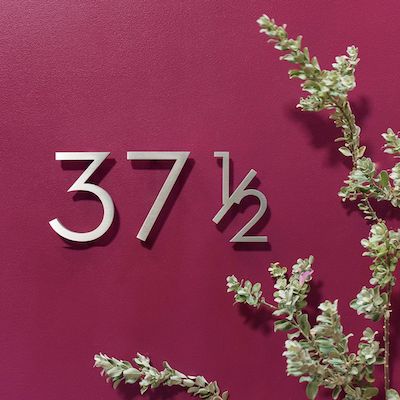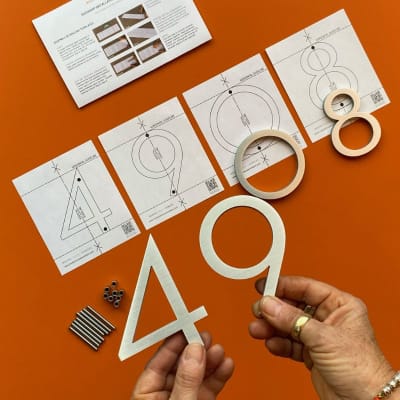When selecting house numbers, the choice of material plays a significant role in both the appearance and longevity of your home’s exterior signage. Among the most popular materials available, aluminum house numbers have become a preferred choice for modern homeowners seeking a blend of durability, sleek design, and long-term reliability. Companies such as Modern House Numbers specialize in crafting high-quality aluminum designs that enhance curb appeal while maintaining structural integrity. As homeowners compare aluminum and steel options, understanding the differences in performance, maintenance, and aesthetic flexibility becomes essential for making an informed decision.
Understanding the Role of Material in House Numbers
The material used for house numbers affects not only visual style but also how well the numbers hold up against environmental factors. Both aluminum and steel are known for their strength and resilience, but they perform differently under various weather conditions. Aluminum, for instance, is naturally resistant to corrosion and rust, making it an ideal option for regions exposed to moisture, humidity, or salt air. Steel, while robust and weighty, can corrode over time unless it is treated with protective coatings. This difference in chemical properties directly influences the longevity and upkeep of each material.

Durability and Weather Resistance
Durability is one of the most critical considerations when investing in house numbers that will be exposed to the elements year-round. Aluminum offers excellent resistance to oxidation, which prevents rust and corrosion even in coastal or rainy climates. This lightweight yet strong metal retains its shape and color for many years, minimizing the need for replacements or repainting. Steel, on the other hand, tends to react more noticeably to environmental stress. Even stainless steel, while more resilient than carbon steel, can develop discoloration and pitting over time if exposed to harsh weather conditions without proper maintenance.
Aesthetic Appeal and Design Flexibility
Aluminum house numbers stand out for their versatile and contemporary appearance. The metal’s natural sheen allows for a refined, modern look that complements various architectural styles from minimalist urban designs to mid-century homes. Aluminum can be powder-coated, anodized, or brushed to achieve different finishes and color tones, offering homeowners greater customization options. Steel numbers, while equally stylish, often project a more industrial or classic look that may not blend as easily with all home designs. Aluminum’s adaptability in both shape and finish makes it a more flexible choice for those seeking a personalized exterior design.
Maintenance Requirements
One of the defining advantages of aluminum is its low-maintenance nature. Unlike steel, which requires occasional polishing or protective treatments to prevent rust, aluminum can be easily cleaned with mild soap and water. It doesn’t require repainting or resealing, saving homeowners time and effort over the years. In contrast, maintaining steel numbers can be more demanding. Exposure to moisture or pollutants can cause tarnishing, requiring regular upkeep to preserve the surface’s shine and integrity. The reduced maintenance burden of aluminum contributes significantly to its growing popularity among modern homeowners.
Weight and Installation Benefits
Aluminum is notably lighter than steel, which makes installation simpler and more secure. The lightweight structure allows for easy mounting on various surfaces, including stucco, brick, wood, and concrete. This feature also reduces strain on mounting adhesives or screws, ensuring a longer-lasting hold. In contrast, the heavier weight of steel may necessitate additional hardware or reinforcements, especially for large number sets. The ease of installation that comes with aluminum house numbers makes them practical for both do-it-yourself projects and professional applications.
Environmental Sustainability
Homeowners today increasingly prioritize environmentally conscious materials for home improvement projects. Aluminum offers a clear advantage in sustainability because it is 100% recyclable without losing its original properties. Many manufacturers utilize recycled aluminum in their production processes, significantly reducing environmental impact. While steel is also recyclable, its heavier composition and higher energy requirements during manufacturing make it a less energy-efficient choice. By choosing aluminum, homeowners can contribute to eco-friendly building practices without compromising on quality or design.
Cost and Long-Term Value
While initial costs may vary, the long-term value of aluminum house numbers often exceeds that of steel alternatives due to their durability and minimal upkeep. Aluminum’s resistance to corrosion means fewer replacements, repairs, or refinishing tasks over time. The material’s longevity ensures that homeowners can maintain a clean and modern exterior aesthetic for decades, making it a smart investment in property appearance and value retention.
Advantages of Aluminum House Numbers
Design Trends and Modern Applications
Modern home design increasingly emphasizes simplicity, minimalism, and precision. Aluminum’s smooth finish and versatility make it an excellent match for these trends. Homeowners can select brushed, matte, or glossy finishes depending on their desired aesthetic. Furthermore, aluminum is easier to cut into custom shapes or fonts, allowing for highly personalized house number designs. This adaptability extends to mounting options, with both floating and flush-mount styles providing different visual effects that enhance the home’s curb appeal.

Conclusion
The choice between aluminum and steel house numbers ultimately depends on the homeowner’s priorities, but aluminum offers clear advantages in durability, aesthetics, and maintenance. Its ability to resist rust, adapt to modern design trends, and provide long-term reliability makes it a standout choice for residential use. With brands like Modern House Numbers, homeowners gain access to high-quality, stylish, and customizable aluminum options that enhance the home’s overall visual appeal while ensuring lasting performance.
FAQs
Why do aluminum house numbers last longer outdoors?
Aluminum naturally resists corrosion and rust, even when exposed to moisture, making it ideal for outdoor applications.
Can aluminum house numbers be customized in size and color?
Yes, aluminum can be anodized or powder-coated in a wide range of colors and finishes, allowing for personalized designs.
Do aluminum house numbers fade over time?
High-quality aluminum finishes are UV-resistant, meaning they retain their color and sheen even under direct sunlight.
How should aluminum house numbers be cleaned?
A simple wipe with a soft cloth and mild soap solution is sufficient to maintain their original shine. No special cleaners are required.
Are aluminum house numbers suitable for coastal homes?
Absolutely. Their corrosion resistance makes them perfect for coastal or humid environments where steel may rust quickly.











Comments (0)